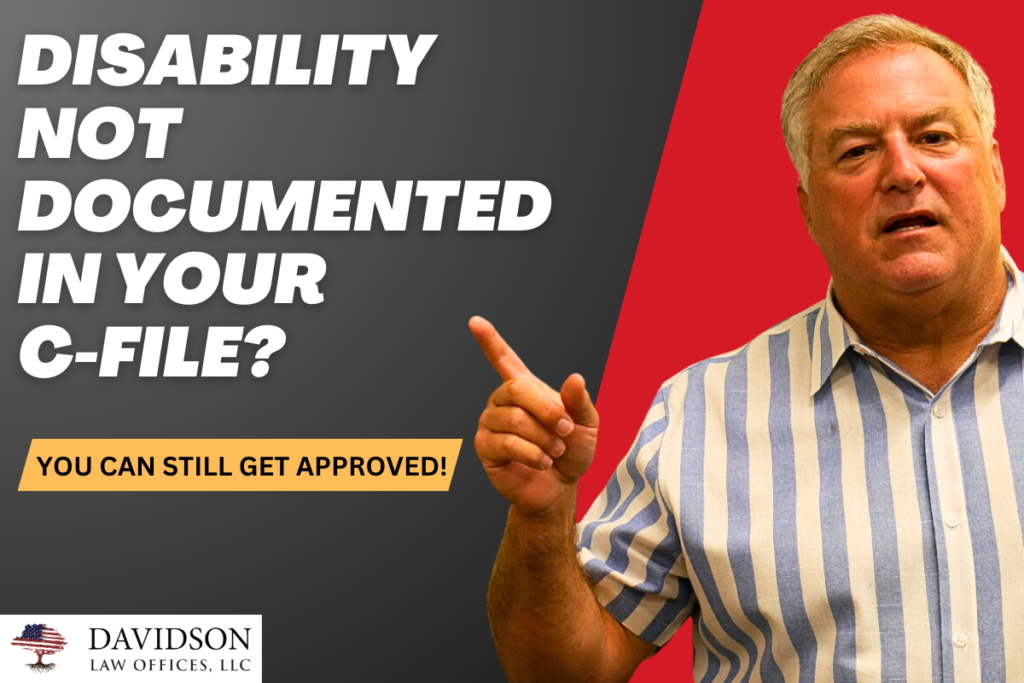How do you get VA disability benefits for a condition or injury that’s not in your C-file? We call that an undocumented disability claim. These claims are for conditions or injuries that manifest after your service, so they’re not documented in your C-file. That’s why we call them an undocumented disability claim. First let’s give some examples of some conditions you can claim without documentation in your service records.
Undocumented Disability Examples
1. Tinnitus
Tinnitus is most often an undocumented disability not indicated in your active duty military treatment records. Some people have recurrent ringing, buzzing, roaring, or clicking in their ears. I do—I have recurring ringing every single day, and sometimes it drives me nuts. Tinnitus usually arises after service.
Here’s a big hint. When you claim tinnitus, go into detail about your MOS (Military Occupational Specialty) and explain to the reviewers that because of your MOS, you have recurrent ringing in your ears. Be as articulate as you can. You have a blank canvas—paint a beautiful picture of your tinnitus. Get friends and family to help you with your statement.
To win your claim on tinnitus, you have to paint a picture to the reviewer that you developed tinnitus because of your MOS. Examples include being a heavy equipment operator, a mortar man, artillery, a tank driver, or working on the flight line. Whatever exposed you to loud noises, paint that picture using your MOS and get your friends and family to help you.
2. PTSD
PTSD won’t show up in your file unless you went for treatment during military service. And if you were diagnosed with PTSD during service, you were probably discharged under a medical discharge. PTSD claims must meet three basic requirements for an award of service connection:
1. A current diagnosis of PTSD by a qualified psychologist or psychiatrist.
2. Credible supporting evidence that the claimed stressor occurred.
3. Medical evidence of a nexus (or connection) between your PTSD and your service.
Let’s focus on the second requirement—credible supporting evidence that the in-service stressor actually occurred. This means evidence corroborating that the alleged traumatic event happened while you were in service. If you were in combat, such as in Vietnam or the Gulf War, you have a lower evidentiary burden to establish the occurrence of a stressor. For example, if people were shooting at you, the VA will generally accept your claim.
For non-combat stressors, these are events that you experienced that were awful, shocking, and terrible. Maybe you were involved in search and rescue, retrieving bodies from hurricanes, or you experienced a terrorist attack. These events probably aren’t in your C-file because you didn’t seek treatment. Veterans were trained to “suck it up,” so they often don’t seek treatment until after service.
When writing your stressor statement, include details of where you were stationed and what happened. If you’ve kept in touch with some of your buddies, get buddy statements to support your claim. Friends and family can also provide statements on how you behaved before and after service. This helps paint the picture of how your experiences affected you and makes it more likely that you will be approved for this type of undocumented disability.
3. Physical Conditions from Service Activities
Let’s say you were a fighter pilot, parachutist, or in airborne school—these roles can cause knee, back, or neck issues. If you got hurt and have treatment records, great, but many times you don’t because you were trained to just push through. After service, these physical issues can come back and would then be considered an undocumented disability. When creating your stressor statements, make sure the reviewer understands what you experienced during service. Explain how activities like jumping out of airplanes or experiencing G-forces affected your body.
4. Presumptive Conditions
These are statutory hall passes. If you were in a certain place during a certain time and have a specific condition, you don’t have to prove a nexus. This includes exposure to Agent Orange in Vietnam, Gulf War burn pits, Camp Lejeune contaminated water, etc. Conditions like type 2 diabetes, Parkinson’s disease, prostate cancer, and hypertension fall under this category. You still need a medical diagnosis, but no medical opinion is needed for the nexus. Presumptions make it easy for Veterans to receive benefits for an undocumented disability, because you don’t have to prove the nexus or connection between your service and the disability.
In closing, let me caution you about cancer. Cancer is treatable, and many go into remission, but remission is not a cure. The VA doesn’t always recognize this. If you were at 100% for cancer and go into remission, the VA might reduce your rating. Monitor everything and address secondary conditions to maintain your rating.
Contact Us for Help!
If you need assistance with VA claims for an undocumented disability, complete this form or give us a call at (229) 226-8183. If you’d like to see this blog in video format, you can watch it below. Please be sure to SUBSCRIBE to our YouTube channel and click the bell notification button so that you’re notified each time we publish a new video.

